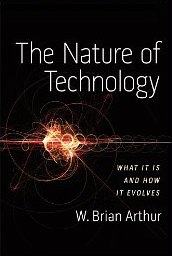Notes
- p.2
positive feedback and random selection
- p.15
technology - evolution vs. creativity
- p.17
why Darwinian evolution is not sufficient
- p.22
technology as combination seeded from "capture" of natural phenomena
- p.24
... continues ... but what about the technological environment context not just components - is the credit card necessary for the development of the modern internet?
- p.28
c.f. defn. 3 "collection of devices and engineering practices available to a culture"
- p.37
modularisation - c.f. refactoring - human ingenuity
- p.38
hierarchical org. - what about the role of infrastructure? e.g. Facebook or electricity
- p.48
Marcy and Butler exo-planet detectors - based on existing technology - but more problem solving-ish
- p.51
"phenomena captured and put to use" but use depends on human & technological context
- p.51
computational analogy "programmed"
- p.54
ubiquity of technology - c.f. computational thinking, etc.
- p.55
human/social technology (e.g. money) - difference is that initial natural phenomena may be culturally "forgotten" no longer needed for technology to proceed
- p.71
domain : technology = prog. lang. : program
- p.73
radical innovation is re-domaining
- p.74
Babbage - calculation by steam
- p.76
domain as language
- p.84
"bridging technologies" between domains
- p.84
"funkiness is not quantifiable"
- p.90
innovation - Schumpeter "invention is co-opted into commercial use" vs. popular sense of "novelty in technology"
- p.91
Design vs. invention !!
- p.98
Design is expression - the idea given form … but the idea needs to be formable, just like thought needs to be sayable
- p.101
"Standard engineering _learns_"
- p.103
Darwinian analogy - if anything more Lamarkian - but wit analytic aspects "this worked - why?", etc.
- p.103
chance due to +ve feedback - yes!!
- p.104/105
dominance of light water reactor
- p.107
1930s thinking of innovation - focused on the "imponderable" creative act
- p.108
examples of novelty all ones where there is an existing 'product' that has its internals re-invented - that is context of need pre-existed (c.f. Firefly)
- p.110
"need" as start point - but "needs" emerge
- p.110
need & phenomenon - two sources of innovation
- p.114/115
insight moments
- p.119
- Flemming & penicillin - but what abutVictorian use on horses
- p.122/123
no "geniuses" just "quiver of functionalities"
- p.124
context - yes but just the technological context?
- p.129
mathematics - looking at the proof not the process
- p.129
linkage - need with principle - not accumulations of small changes
- p.139
locking in due to surrounding structures and organisations
- p.141
elaboration & (Kuhn-ian) simplification - elaboration wins! - c.f.language
- p.149
collapse (16 Oct 1847) of the railway bubble
- p.153
technologies are not "adopted" but merge with existing economy
- p.159
deep craft
- p.162
countries that lead in science lead in technology
- p.163
gov't pursue science for commercial purposes - rarely works!!
- p.164
innovation not "vaguely invoking ... creativity"
- p.169/170
"technology is autopoetic" - seems to ignore human element
- p.171
- 'second day' (me) - combinations - c.f. Mithin
- p.174
"opportunity niches"
- p.178
"active network of technologies"
- p.185
story of artificial evolution of logic circuits "some ... circuits ... not fulfilled at all" - human creativity
- p.186
periods of quiescence ... but what effect does rapid communication have?
- p.187
"Darwinian Bottleneck"
- p.193
"economy is an expression of its technologies"
- p.206
digital links domains "objects of the same type" c.f. words
- p.214
Heidegger - tech not in man's control - an end in itself
- p.216
a hopeful end!!
